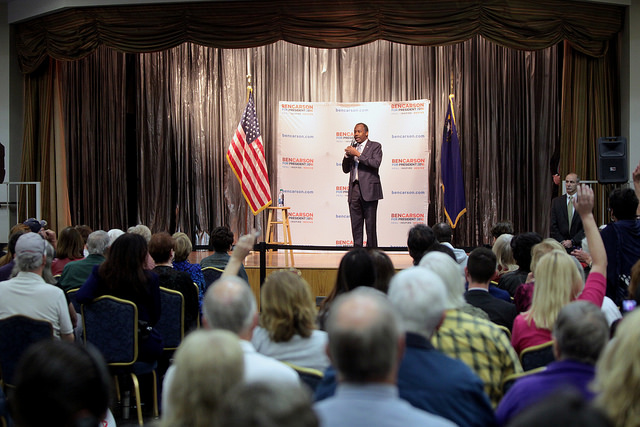Dr. Ben Carson, the nominee for secretary of the U.S. Department of Housing and Urban Development, would not provide his assurance that if he leads the department, federal housing money would never financially benefit the president-elect.
Carson's comments came during an intense line of questioning from Sen. Elizabeth Warren (D-Mass.) during his confirmation hearing Thursday morning before the U.S. Senate Committee on Banking, Housing, and Urban Affairs.
The confrontation came a day after President-Elect Donald Trump outlined a plan he said would minimize conflicts of interest between the real estate empire he leads and the federal government he'll lead in less than two weeks. Many experts -- including the federal government's ethics chief -- have called those plans "wholly inadequate."
Warren -- one of Trump's fiercest critics -- asked for Carson's pledge "that not a single taxpayer dollar that you give out will financially benefit the president-elect and his family."
Carson did not offer that pledge. Instead, he pledged to act according to his moral code. Warren said Carson couldn't offer the committee those assurances because he -- like the rest of the public -- doesn't know the extent of Trump's holdings.
The hearing largely lacked any fireworks, and it provided only an inkling of the policy views of the famed neurosurgeon who has no professional experience working in the government or housing sectors.
Carson and his allies described the doctor as a big-picture thinker who sees the agency's role as broader than just housing. "I would argue to you that the most important qualification that I look for in a HUD secretary is someone who understands HUD isn't just about providing people a place to live," said Sen. Marco Rubio (R-Fla.), who ran against Carson for the 2016 Republican presidential nomination. "At its core, HUD is about the American Dream."
Indeed, Carson told -- as he often does -- the story of his upbringing in poverty in Detroit, and how his mother's insistence on his education ultimately allowed him to pursue his successful medical career.
That personal background was reflected in his testimony. He offered skepticism at government aid and emphasized his belief that those from disadvantaged backgrounds should be encouraged to lift themselves up by their own bootstraps. "What has happened, too often, is that people who seemingly mean well have promoted things that do not encourage the development of innate talent in people," Carson told the committee. "And hence we have generation after generation of people living in dependent situations."
"Do I think we should be spending a little more time and effort concentrating on developing the potential of our people? The answer to that is yes," he said.
To that end, Sen. Sherrod Brown (D-Ohio), the committee's top Democrat, asked Carson whether he supported increasing the minimum wage and the Obama administration's effort to expand overtime to some workers. Carson did not answer that question and instead stated that he supports "creating an environment that encourages entrepreneurial risk-taking and capital investment."
To that end, Sen. Catherine Cortez Masto (D-Nevada) suggested it would be virtually impossible for someone earning the federal minimum wage of $7.25 per hour to work enough hours to pay for their housing while also having time to pursue education or training opportunities to improve their circumstances. She asked Carson whether he believes there should be limits on public assistance for low-income Americans.
"We have to be cognizant of our fiscal responsibilities as well as our social responsibilities," he said.
Carson was also challenged by Sen. Bob Menendez (D-N.J.), who questioned Carson about his previous statements that poverty could be eliminated simply by lifting all government regulations. Menendez asked Carson whether he believes in the mission of HUD. Carson said he does.
The nominee provided scant views about his specific policy vision for the agency, and at times, he was outright vague.
"I want to put together a world-class plan on housing in this country, and I want to come to you with that world-class plan," Carson told the committee. "I want to convince you that it's what we need to do." He didn't hint on what may be contained in that forthcoming plan if he's confirmed.
Carson did say he views HUD's rental assistance program as "essential." He also responded to a question about the Supreme Court's 2015 ruling requiring efforts to "affirmatively further" fair housing, saying he'd uphold the law.
In an op-ed penned shortly after that 2015 Supreme Court ruling -- seen as a major victory for fair housing -- Carson expressed skepticism of efforts to advance fair housing. “These government-engineered attempts to legislate racial equality create consequences that often make matters worse,” he wrote.
But Carson said Thursday he would abide by the court's ruling. "It has become the law of land, and of course if confirmed, I will enforce it," he said.
He also said he's aware of the "housing first" philosophy that's been embraced by HUD and a growing number of service providers across the country and wants to study it more.
Carson said he sees the value of the Community Development Block Grants, which are popular because they provide funding directly to local governments and service providers and can be used in many different ways. But he also acknowledged reports from HUD's inspector general about misuse of CDBG funds.
"(CDBG) is very important because it gives people a great deal of flexibility," Carson said. "I'd be looking to increase the flexibility, but at the same time, have much better control of the finances."

